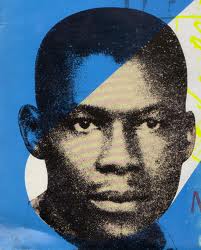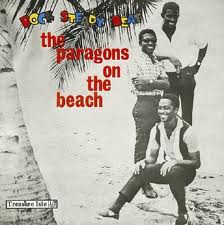
The great arch-rival to Clement ‘Coxsone’ Dodd in the music production and sound system business in Jamaica during the 1950s was Arthur Reid, more popularly known as ‘Duke Reid The Trojan’, named after his sound system of that same name, and which, in turn, was named after his Trojan van, which took his music equipment and accoutrements around to dances. When the van arrived for dances, there would be tumultuous shouts of “Here comes The Trojan”, and ‘Duke Reid The Trojan’ he became.
Approximately 10 years Dodd’s senior, the Jamaica-born Reid, followed somewhat of a similar route to success as Dodd did, having spanned the areas of sound-system operation and record production. Reid, however, had established himself, (perhaps between 1953-1954) a couple years earlier than Dodd, creating ecstatic scenes wherever he played.

Strangely, though, The Trojan’s earliest ambition was never in the field of music. His first claim to fame was as a young, burly policeman, who gave the force 10 years of sterling service, before deciding to move into other areas of interest. Those areas bordered on music and a liquor store business, which he jointly owned and operated with his wife, Lucille, at 33 Bond Street in the heart of West Kingston.
On the musical side, Reid’s ever-increasing interest and love for the American rhythm and blues music lured him into the sound-system business, and combined with his interest in his liquor store business, it had him employed almost full time.

In pursuit of his goals, he built and brought to prominence by 1954 his ‘Trojan’ sound system. His efforts in this area were never to go unrewarded. For his stellar performances, Reid was crowned, ‘King of Sound and Blues’ at the Success Club along Wildman Street in Kingston during the late 1950s. There was also another mention made of him being crowned by the rock and roll giant Fats Domino at Kings Lawn, along North Street, in Kingston in the early 1960s.
PASSION FOR GUNS
The exciting and colourful Reid made another giant step when he entered the world of recording and record production in the late 1950s, and this, perhaps, is what he was best remembered for. Although he had left the force, he still retained a passion for that job and continued to wear his guns at all times – .45 and .22 calibre pistols, tucked in his waistband, with a rifle at his side, during recording sessions.
Occasionally, he would release a couple pellets in celebrating his approval of a successful audition. One critic jokingly asserted that he even kept them on while in the shower.
His first issues were a series of 78 rpm records on his ‘Trojan’ label before setting up his established labels, Duke Reid, Dutchess (named after his wife), and Treasure Isle.
Ironically, it was the decline in the availability of the jumping, shuffling, American R&B records that gave Reid the impetus and inspiration to venture full time into recording and producing songs by Jamaican artists that still carried that R&B feel.

Jamaicans still retained that insatiable appetite for the R&B that rocked dancehalls in the mid-to-late 1950s, and so Reid created his second label, ‘Duke Reid’, in 1959, to issue homemade recordings in the American style. His efforts attracted a pool of aspiring singers in the form of Derrick Morgan, Stranger Cole, Charles Josephs, and Dobby Dobson (Chuck and Dobby), Eric Morris, The Jiving Juniors, Alton and the Flames, and a backing band he labelled Duke Reid’s Group, which comprised a wide cross-section of Kingston’s best musicians.
With this aggregation, Reid managed to unleash a deluge of hit recordings, which, initially, were played only on his sound-system before being released to the public or to radio stations.

His initial impact with his first set of recordings was almost electrifying, sending dance fans rocking to Derrick Morgan’s S-Corner Rock, Stranger Cole’s Ruff and Tuff, Stranger and Patsy’s When I Call Your Name, The Jiving Juniors’ Lollipop Girl, Chuck and Dobby’s Du-du-Wop, Alton and the Flames’ Dance Crasher, The Techniques’ Little Did You Know, and others.

Just by chance, in 1963, Reid managed to get into his production line the trio, Justin Hines and the Dominos, who, after missing an appointment with Clement Dodd, ended up with Reid. Their recordings, which sent haunting messages through the rich tradition of Jamaican proverbs and parables, immensely increased the stature of Reid as a record producer, while Hinds himself became the most successful artist for the producer between 1964 and 1966. Reid, who had done most of his early recordings at Federal Records, built his own studio above his liquor store in the mid-1960s, ensuring full artistic control of his works and more time and devotion towards the end product.
BIRTH OF ROCKSTEADY
When the popular beat changed to rocksteady in late 1966, Reid soared to even greater heights with an influx of sweet-sounding groups like The Paragons, The Melodians, The Techniques, The Jamaicans, The Sensations, and The Silvertones. All crafted some enduring classics that epitomised the best that the rocksteady genre had to offer.
There were outstanding solo performances, too, from John Holt, Alton Ellis, songbird Phyllis Dillon and Hopeton Lewis, who shocked the world with the 1970 Festival winner Boom Shaka Laka.
But just as Reid seemed to be losing ground towards the end of the decade, here comes deejay Ewart Beckford (U-Roy) to create history for him and put Reid back on top. U-Roy’s first three recordings for Reid –Wake The Town (versioning Alton Ellis’ Girl I’ve Got a Date), Rule the Nation (versioning The Techniques’ Love is not a Gamble), and Wear you to the Ball, a Paragons original – all achieved number-one status. U-Roy followed up with several other top 10 hits.
Reid, thus has the distinction of producing a set of recordings, that heralded a new style of deejaying, where the deejay, unlike his predecessors who interjected occasional raps or shouts, rode the instrumental track all the way through. Wear You to the Ball was special. It inspired an entire generation of toasters, boasters, and rappers locally and internationally.
broyal_2008@yahoo.com






You must log in to post a comment.